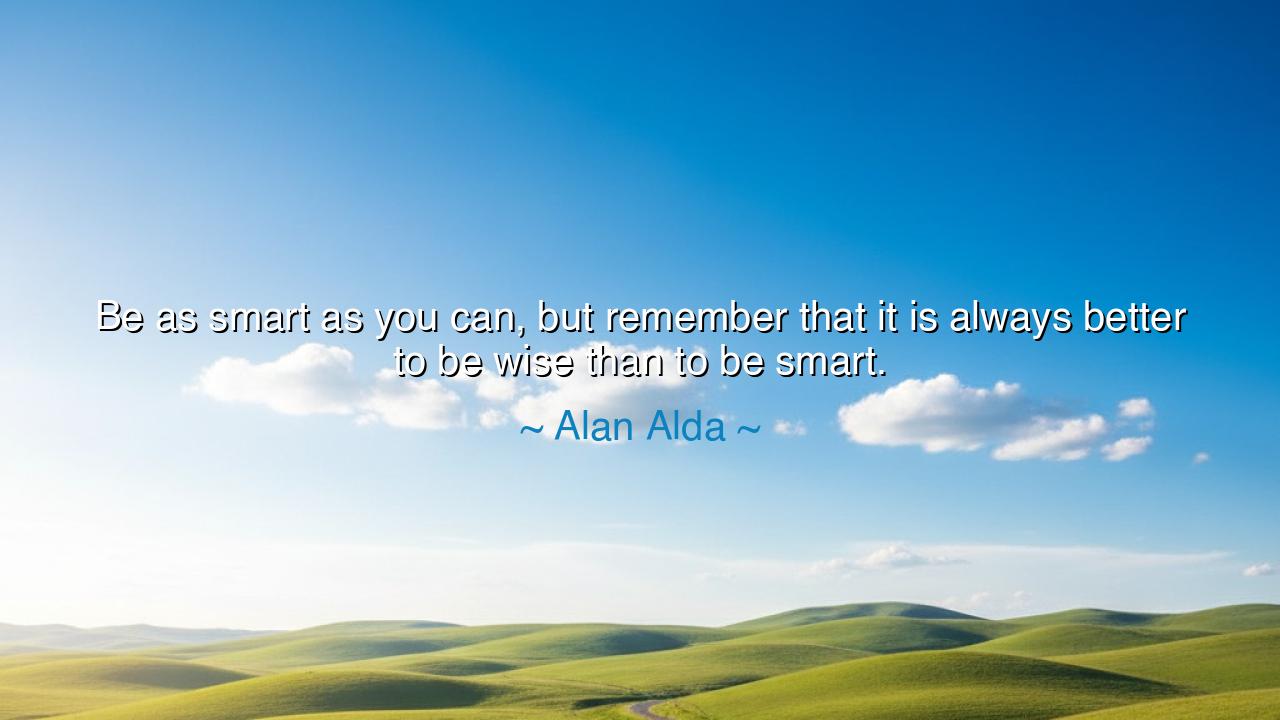
Be as smart as you can, but remember that it is always better to
Be as smart as you can, but remember that it is always better to be wise than to be smart.






“Be as smart as you can, but remember that it is always better to be wise than to be smart.” — thus spoke Alan Alda, the actor, writer, and philosopher of the human heart, whose words carry the quiet weight of truth learned through life, not merely through books. In this saying, he draws a line between two kinds of light — the bright, flickering light of intelligence, and the deep, enduring flame of wisdom. To be smart is to know; to be wise is to understand. One fills the mind; the other enriches the soul. Alda reminds us that though intellect may win debates and build machines, it is wisdom that builds peace, compassion, and meaning.
The origin of this quote lies in Alda’s reflections on learning and humanity. Known not only for his wit but for his lifelong curiosity, he studied science, philosophy, and empathy in equal measure. Yet through all his pursuits, he saw that cleverness without conscience leads only to confusion. The world is full of those who are smart — brilliant in calculation, inventive in argument — yet empty in understanding what truly matters. Alda’s words, spoken with humility, arise from this truth: that intelligence is a tool, but wisdom is a guide. The mind can climb mountains; the heart must choose which mountains are worth climbing.
To be smart, then, is to master facts; but to be wise is to master oneself. Intelligence looks outward, gathering knowledge like a collector hoarding jewels; wisdom looks inward and knows which jewels are real. The smart man asks, “Can it be done?” The wise man asks, “Should it be done?” The smart man seeks victory; the wise man seeks harmony. History, alas, is filled with those who were clever enough to conquer the world, yet too blind to rule their own hearts. Alda’s voice, gentle yet firm, calls us back to the balance that the ancients prized — the harmony between mind and virtue.
Consider the story of Oppenheimer, the father of the atomic bomb. He was among the smartest men who ever lived, a master of equations that unraveled the secrets of the universe. Yet when he beheld the terrible power his brilliance had unleashed, he recalled the words of the Bhagavad Gita: “Now I am become Death, the destroyer of worlds.” In that moment, knowledge turned to sorrow, and intelligence without wisdom revealed its cost. Alda’s teaching would have whispered to him: be as smart as you can, but never forget to be wise. For wisdom tempers the mind’s fire with the cool waters of conscience.
Wisdom, unlike intelligence, is not learned from books alone. It is born from experience, reflection, humility, and love. It grows in those who listen more than they speak, who see more than they judge. The wise understand that every fact serves a larger truth, and every action carries a moral weight. Where intelligence divides, wisdom unites; where intelligence rushes forward, wisdom pauses and perceives. To be wise is to see the pattern behind the chaos — to know that kindness often solves what logic cannot.
And yet, Alda does not dismiss the mind. “Be as smart as you can,” he says — for ignorance serves no one. The world needs thought, reason, and the discipline of intellect. But intelligence must remain the servant, not the master. The wise man uses his intelligence as the farmer uses the plow — not to show its sharpness, but to cultivate the soil of goodness. Knowledge without wisdom is power without direction, and power without direction becomes destruction.
So, my listener, take this teaching to heart. Strive to learn, to question, to think deeply and clearly. But when you have learned all you can, go further — live wisely. Let your intelligence be guided by compassion, your decisions by understanding, your strength by humility. The world will always celebrate the clever, but it is shaped by the wise.
For in the end, Alan Alda’s words remind us that the measure of a life is not how much one knows, but how well one lives. The smart man seeks to make himself great; the wise man seeks to make the world better. Be both, if you can — but if you must choose, always choose to be wise. For the clever may dazzle for a moment, but the wise illuminate forever.






AAdministratorAdministrator
Welcome, honored guests. Please leave a comment, we will respond soon